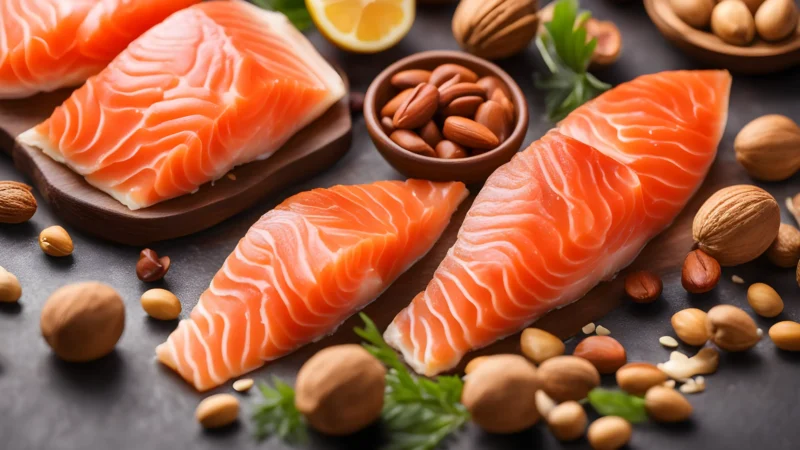Table of Contents
ToggleIntroduction
In recent years, benefits of high fat diet have gained significant attention in the world of nutrition. These diets, characterized by an increased intake of healthy fats, have intrigued people for various reasons.
But what are the potential benefits of a high-fat diet, and is it the right choice for you? In this comprehensive guide, we will delve into the science behind high-fat diets and explore their potential advantages in different aspects of health and well-being.
What is a High-Fat Diet?
Before we dive into the benefits, let’s clarify what a high-fat diet entails. A high-fat diet emphasizes the consumption of healthy fats, such as those found in avocados, nuts, seeds, and fatty fish, while reducing the intake of carbohydrates.
The goal is to shift the body’s primary energy source from carbohydrates to fats.
Why Are People Interested in High-Fat Diets?
The intrigue surrounding high-fat diets can be attributed to several factors. Firstly, they offer an alternative approach to weight management and overall health.
Secondly, proponents claim that high-fat diets can positively influence cholesterol levels, cognitive function, type 2 diabetes, arthritis, and even cancer prevention. Let’s explore each of these potential benefits in detail.
How Can a High-Fat Diet Help You Lose Weight?
the body to enter a state of ketosis, where it burns fat for energy instead of carbohydrates. This shift can lead to effective weight loss by reducing hunger and stabilizing blood sugar levels.
Moreover, fat provides a longer-lasting feeling of fullness, reducing overall calorie consumption.
What Are the Studies that Support the Weight Loss Benefits of a High-Fat Diet?
Several studies have shown promising results in favor of high-fat diets for weight loss. Research published in the Journal of Clinical Endocrinology & Metabolism found that participants on a high-fat, low-carb diet lost more weight than those on a low-fat diet.
These findings align with other studies that emphasize the importance of dietary fat in achieving sustainable weight loss.
What Are the Potential Downsides of a High-Fat Diet for Weight Loss?
While high-fat diets can be effective for some, they may not be suitable for everyone. Potential downsides include difficulty in adhering to the diet, nutrient deficiencies, and digestive issues.
It’s essential to consult with a healthcare professional before starting any diet plan, especially if you have underlying health conditions.
How Can a High-Fat Diet Affect Cholesterol Levels?
Contrary to conventional wisdom, high-fat diets can have a positive impact on cholesterol levels. These diets typically increase high-density lipoprotein (HDL) cholesterol, which is considered beneficial, while reducing levels of low-density lipoprotein (LDL) cholesterol, often associated with heart disease risk.
What Are the Studies that Support the Cholesterol-Lowering Benefits of a High-Fat Diet?
- The Women’s Health Initiative (2006): A long-term study involving thousands of women found that a low-fat diet did not significantly reduce the risk of heart disease. This suggests that reducing total fat intake, as long as it doesn’t compromise healthy fats, may not be the best approach for heart health.
- The PREDIMED Trial (2013): Focusing on the Mediterranean diet, which is inherently higher in healthy fats, this trial demonstrated that participants following the Mediterranean diet experienced a reduced risk of heart disease, stroke, and lower LDL cholesterol levels compared to those on a low-fat diet.
- The PURE Study (2017): The Prospective Urban Rural Epidemiology (PURE) study, involving participants from 18 countries, found that higher fat consumption, particularly from healthy sources like nuts and seeds, was associated with a lower risk of heart disease and stroke.
These studies collectively provide substantial evidence that a high-fat diet, when it prioritizes healthy fats and minimizes processed and trans fats, can have a positive impact on cholesterol levels.
Healthy fats, such as monounsaturated fats found in olive oil and polyunsaturated fats like those in fatty fish, are known to improve lipid profiles by raising HDL cholesterol (the “good” cholesterol) and reducing LDL cholesterol (the “bad” cholesterol) and triglycerides.
What Are the Potential Downsides of a High-Fat Diet for Cholesterol Levels?
- Nutrient Balance: A potential downside of high-fat diets is that they might lead to imbalances in nutrient intake. If individuals focus solely on fats and neglect essential nutrients like fiber, vitamins, and minerals from fruits, vegetables, and whole grains, they could miss out on critical elements of a healthy diet. It’s essential to maintain a balanced approach by incorporating a variety of nutrient-rich foods.
- Digestive Issues: Some people may experience digestive discomfort, such as diarrhea or constipation, when adopting a high-fat diet. This can be due to the rapid increase in fat intake, which may not align with their body’s accustomed digestion patterns. Gradual dietary adjustments and staying hydrated can help mitigate these issues.
- Caloric Intake: High-fat diets can be calorie-dense due to the higher fat content. Consuming excessive calories, even from healthy fats, can lead to weight gain, which may negate some of the potential benefits of cholesterol levels. It’s important to be mindful of portion sizes and overall calorie intake when following a high-fat diet.
How Can a High-Fat Diet Improve Cognitive Function?
The brain’s high fat content suggests that dietary fats play a crucial role in cognitive function. High-fat diets, particularly those rich in omega-3 fatty acids, have been linked to improved memory, focus, and overall brain health.
What Are the Studies that Support the Cognitive Benefits of a High-Fat Diet?
Research in the journal Nutritional Neuroscience highlights the positive impact of omega-3 fatty acids found in fish and flaxseeds on cognitive function. Omega-3s are known to reduce inflammation in the brain and support the growth of brain cells.
What Are the Potential Downsides of a High-Fat Diet for Cognitive Function?
While high-fat diets can be beneficial for cognitive function, excessive consumption of unhealthy fats, such as trans fats and saturated fats, may have adverse effects. Moderation and choosing healthy fats are key to reaping cognitive benefits.
How Can a High-Fat Diet Help Manage Type 2 Diabetes?
High-fat diets can benefit individuals with type 2 diabetes by promoting better blood sugar control. When carbohydrates are restricted, blood sugar levels remain stable, reducing the need for insulin and improving insulin sensitivity.
What Are the Studies that Support the Type 2 Diabetes Benefits of a High-Fat Diet?
- The Study of Diet, Obesity, and Genes (Diogenes): This large-scale European study explored the effects of different diets on weight loss and diabetes management. One arm of the study focused on a high-protein, low-glycemic index (GI) diet, which is inherently higher in healthy fats. Participants following this high-fat diet experienced improved blood sugar control and reduced insulin resistance.
- The Virta Health Study (2019): Virta Health conducted a clinical trial involving individuals with type 2 diabetes who followed a ketogenic diet, which is a specific type of high-fat, low-carbohydrate diet. The study found that participants achieved significant reductions in HbA1c levels, a key marker of blood sugar control. Some participants were even able to reduce or eliminate diabetes medications.
- A Randomized Controlled Trial (2018): Published in the journal Nutrition & Diabetes, this study compared a low-carb, high-fat diet to a low-fat diet in individuals with type 2 diabetes. The high-fat diet group experienced better glycemic control, reduced medication use, and improvements in insulin sensitivity compared to the low-fat group.
What Are the Potential Downsides of a High-Fat Diet for Type 2 Diabetes?
- Individual Variability: One of the primary concerns with high-fat diets for type 2 diabetes is individual variability. People with diabetes have diverse metabolic responses to dietary changes. While some may experience improved blood sugar control on a high-fat, low-carb diet, others may find it less effective or even challenging to adhere to.
- Digestive Issues: A sudden increase in dietary fat intake can lead to digestive discomfort for some individuals. Symptoms like diarrhea, bloating, or abdominal cramping may occur as the body adjusts to the dietary changes. Gradually transitioning to a high-fat diet and choosing easily digestible fats can help mitigate these issues.
How Can a High-Fat Diet Help Relieve Arthritis Symptoms?
High-fat diets rich in anti-inflammatory fats, such as omega-3s and monounsaturated fats, may alleviate the symptoms of arthritis. These fats can reduce joint inflammation and pain.
What Are the Studies that Support the Arthritis Benefits of a High-Fat Diet?
- The Role of Omega-6 Fatty Acids (2016): A study published in the journal Nutrients examined the balance between omega-6 and omega-3 fatty acids in the diet. While omega-3s are known for their anti-inflammatory properties, excessive intake of omega-6s, often found in vegetable oils and processed foods, can promote inflammation. The study emphasized the importance of achieving a proper balance between these two types of fats to manage arthritis symptoms.
- Anti-Inflammatory Effects of Olive Oil (2018): A review article published in the International Journal of Molecular Sciences highlighted the potential anti-inflammatory effects of compounds found in olive oil, such as oleocanthal. These compounds have been linked to reduced inflammation and may offer relief to individuals with various forms of arthritis.
- Ketogenic Diet and Inflammatory Biomarkers (2019): A small-scale study published in the journal Nutrients explored the impact of a ketogenic diet, which is high in healthy fats, on inflammatory biomarkers in individuals with osteoarthritis. The results showed significant reductions in inflammatory markers, suggesting that a high-fat, low-carbohydrate diet might have anti-inflammatory benefits for arthritis sufferers.
What Are the Potential Downsides of a High-Fat Diet for Arthritis?
While high-fat diets may help some arthritis sufferers, others may not experience significant relief. Individuals with arthritis need to work closely with their healthcare providers to determine the most suitable dietary approach.
How Can a High-Fat Diet Help Prevent Cancer?
Emerging research suggests that high-fat diets, particularly those emphasizing healthy fats and plant-based sources, may contribute to cancer prevention by reducing chronic inflammation and oxidative stress.
What Are the Studies that Support the Cancer Prevention Benefits of a High-Fat Diet?
- The Mediterranean Diet and Cancer Risk (2019): Research published in the journal Cancer Medicine investigated the Mediterranean diet, known for its high-fat content from sources like olive oil and nuts. The study suggested that adherence to the Mediterranean diet was associated with a lower risk of various cancer types, including breast and colorectal cancers.
- The Role of Omega-3 Fatty Acids (2018): Omega-3 fatty acids, found in fatty fish and flaxseeds, have been extensively studied for their potential cancer-preventive properties. Research published in the journal Nutrients indicated that omega-3s may inhibit the growth of cancer cells and reduce inflammation, both of which are factors associated with cancer development.
- Ketogenic Diet and Cancer (2020): Some preliminary research has explored the use of ketogenic diets, which are high in healthy fats and low in carbohydrates, as an adjunctive therapy for cancer patients. A study published in the journal Aging reported that the ketogenic diet might inhibit cancer cell growth and enhance the effectiveness of conventional cancer treatments.
What Are the Potential Downsides of a High-Fat Diet for Cancer Prevention?
- Unhealthy Fats: Not all fats are equal when it comes to cancer prevention. While healthy fats like those found in olive oil and fatty fish may have protective effects, excessive consumption of unhealthy fats, particularly saturated fats and trans fats, is associated with an increased cancer risk. These fats are often found in processed and fried foods.
- Potential Impact on Hormones: High-fat diets may influence hormone levels, including insulin and insulin-like growth factor 1 (IGF-1). Elevated levels of these hormones have been linked to an increased risk of certain cancers, such as breast and colorectal cancer. It’s important to choose fats that do not lead to significant hormonal fluctuations.
- Inflammation: Chronic inflammation is a known contributor to cancer development. While some fats, particularly omega-3 fatty acids, have anti-inflammatory properties, excessive consumption of pro-inflammatory fats, like omega-6 fatty acids found in some vegetable oils, may promote inflammation. Maintaining a proper balance between these fats is crucial.
Embracing a Healthier Lifestyle:
In this comprehensive exploration of high-fat diets, we’ve uncovered a multitude of potential health benefits. From weight loss to improved cholesterol levels, cognitive function, type 2 diabetes management, arthritis relief, and even cancer prevention, high-fat diets offer intriguing possibilities for better health.
Recommendations for people who are considering trying a high-fat diet:
- Consult with a healthcare professional: Seek personalized guidance before making significant dietary changes, especially if you have underlying health conditions.
- Choose healthy fats: Emphasize sources of healthy fats, such as avocados, nuts, seeds, and fatty fish, while limiting saturated and trans fats.
- Monitor your body’s response: Pay attention to how your body reacts to the diet, and be open to adjustments as needed.
- Maintain a balanced diet: High-fat diets should still incorporate a variety of nutrients from fruits, vegetables, and lean proteins.
- Stay informed: Continue learning about the latest research and nutritional recommendations.
Ready to Embrace the High Fat Journey?
- The Ultimate Keto Meal Plan: From breakfast to dinner and everything in between, this guide provides mouth watering recipes, invaluable tips, and a roadmap to achieving your health and wellness goals.
- Keto-friendly cookbook: Explore a variety of delicious high-fat recipes with this cookbook.
FAQs
Q1: Can I eat any type of fat on a high-fat diet?
A1: While high-fat diets emphasize healthy fats, it’s crucial to limit or avoid trans fats and saturated fats. Focus on sources like avocados, nuts, seeds, and fatty fish.
Q2: Is a high-fat diet suitable for vegetarians and vegans?
A2: Yes, vegetarian and vegan high-fat diets can be achieved by incorporating plant-based sources of healthy fats like nuts, seeds, and plant oils.
Q3: Can I lose weight on a high-fat diet without exercising?
A3: While exercise can enhance weight loss efforts, some individuals do experience weight loss on high-fat diets without a significant exercise regimen. However, combining diet and exercise often produces the best results.
Q4: Are there any potential side effects of a high-fat diet?
A4: Potential side effects can include digestive issues, nutrient deficiencies, and difficulty adhering to the diet. It’s essential to monitor your body’s response and consult with a healthcare professional as needed.
Q5: Is a high-fat diet suitable for children?
A5: High-fat diets for children should be approached with caution and only under the guidance of a healthcare professional. Children have unique nutritional needs, and their diets should be carefully balanced.
This article is intended to provide information and should not replace professional medical advice. Always consult with a healthcare provider before making significant dietary changes, especially if you have underlying health conditions or concerns.











